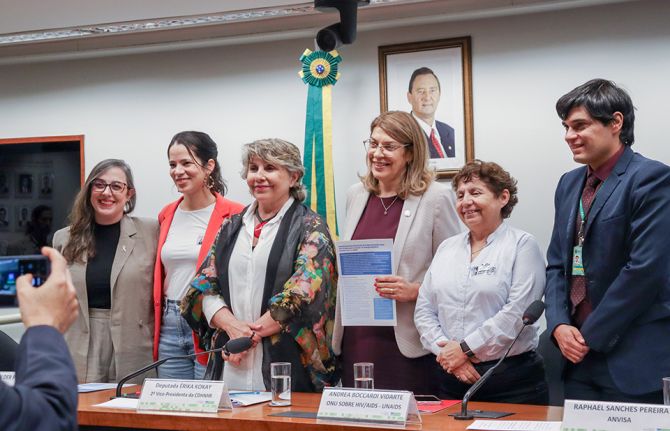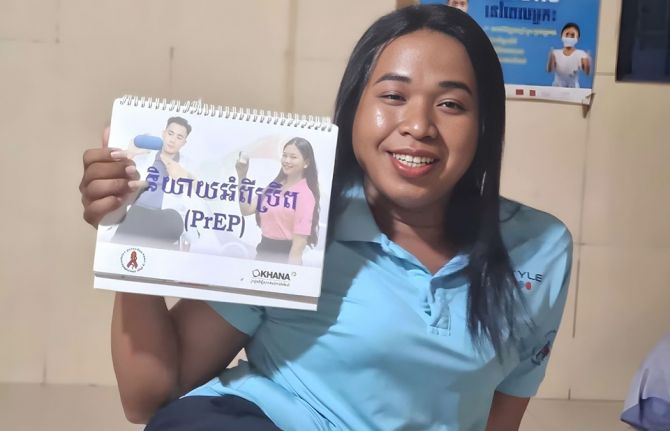
Feature Story
UNAIDS Executive Director meets with Brazilian Government and civil society
30 March 2009
30 March 2009 30 March 2009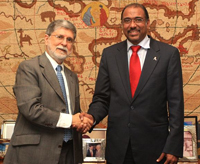
UNAIDS Executive Director Michel Sidibé (right) met with Minister of Foreign Affairs, Mr Celso Amorim.
Credit: UNAIDS/M. Silva
The upcoming Group of Twenty (G20) meeting in London, the global financial crisis, and universal access were some of the main topics Mr Michel Sidibé and Brazilian Government counterparts discussed during his first official visit to Brazil as the Executive Director of UNAIDS.
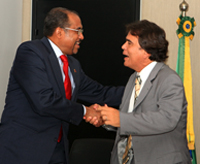
UNAIDS Executive Director Michel Sidibé (left) greets Minister of Health of Brazil, Mr José Gomes Temporão.
Credit: UNAIDS/M. Silva
Mr Sidibé met with the Minister of Foreign Affairs, Mr Celso Amorim, the Minister of Health, Mr José Gomes Temporão, the Minister of Human Rights, Mr Paulo Vanucchi, and the Minister of Women’s Affairs, Ms Nilcéa Freire.
A meeting also took place between Mr Sidibé and the HIV/AIDS Parliamentarian Group, the LGBTT (lesbian, gay, bisexual, transgender and transvestite) Citizenship Group and the Human Rights Commission. The forum which took place at the National Congress in the capital Brasilia, was an opportunity for lively exchange of ideas and viewpoints on a range of issues at the heart of Brazil’s efforts to respond to the HIV epidemic and address human rights. These issues were also underlined in meetings Mr Sidibé had with the President of the Congress and the Senate President.
Civil society share challenges and barriers in responding to diverse epidemics
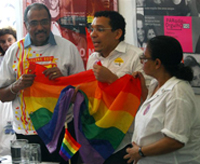
UNAIDS Executive Director Michel Sidibé meets representatives of group Arco-Iris.
Credit: UNAIDS/D. Ramalho
Two separate meetings with civil society groups in Rio de Janeiro provided Mr Sidibé an overview of the challenges facing several populations most affected by HIV, including sex workers, transgenders, gay adolescents and indigenous peoples in the Amazon region.
With ten national representatives of the Brazilian Interdisciplinary Association of AIDS (ABIA), Mr Sidibé was informed of the difficulties in responding to the many faces of Brazil’s epidemics.
HIV prevention was underscored by many representatives as an urgent issue to address, with a lack of resources to reach out to the groups most-at-risk from HIV seen as the biggest hurdle in preventing new infections.
With Grupo Arco-Íris (Rainbow Group), Mr Sidibé heard from several representatives of diverse lesbian, gay, bisexual, transgender and transvestite groups. They explained the concerns and challenges faced by them as LGBTT living in Brazil.
Grupo Arco-Íris is advocating for a change in the law in the federal senate that would make homophobic acts a criminal offence. So far, the group has collected more than 40,000 signatures in support of the law. The group also launched a HIV prevention campaign called “entre garotos” (between boys) that targets gay adolescents between the ages of 16 and 22 through tailored advertising and information displays at cafes, bars, dance halls, and other venues popular with young men who have sex with men.
Mr Sidibé pledged his continuing support to the LGBTT community and encouraged its members to mobilize and rally around efforts to achieve universal access to HIV services in Brazil.
Right Hand Content
Multimedia:
Feature stories:
Brazilian children’s society offers a home from home for children living with HIV (27 March 2009)
TB/HIV, universal access, and human rights key items on UNAIDS Executive Director’s agenda in Brazil (24 March 2009)

